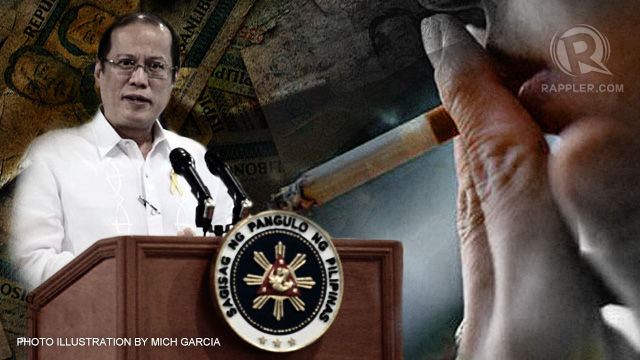SUMMARY
This is AI generated summarization, which may have errors. For context, always refer to the full article.

MANILA, Philippines – The long wait is over.
On Thursday, December 20, President Benigno Aquino III signed the sin tax bill into law, ending a grueling battle to reform the Philippines’ excise tax system.
“Today, we sign, finally, a law that serves as an early Christmas gift to millions of Filipinos who will be covered by the universal health care program, who will benefit from new public clinics and hospitals that will be built, and who will be discouraged from smoking and drinking,” the President said in a speech at the signing ceremony in Malacañang.
The law imposes higher taxes on tobacco and alcohol products, overcoming a strong industry lobby that kept prices in the Philippines among the cheapest in the world.
It will generate additional revenues of roughly P34 billion in the first year of implementation that will be spent for the universal health care program and tobacco farmers’ livelihood.
Aquino, who flexed his political muscle to get the measure passed, thanked lawmakers and advocates who helped push for the reform bill.
“Many believed it was impossible to pass the sin tax bill. Those who are opposing it are strong, noisy, organized, and they have deep pockets.”
“But we have proven: nothing is impossible for Filipinos who are sailing in the same direction, whose hearts are in the right place, and who are ready to fight for their principles,” he said.
He then gave assurance that the law will provide “a level playing field” for industry players. “It’s not fair that different taxes are applied on the same products,” he stressed.
Passing the measure is a milestone for Aquino, who succeeded in what his predecessors tried but failed to do. Efforts to restructure the excise tax system never made it out of committee level in Congress in nearly 16 years.
Debates, controversies
The road to a reformed sin tax structure was thorny. It was full of heated debates that diluted what was initially an ideal bill, as well as controversies that saw the resignation of some lawmakers from their committee posts.
In the Senate, ways and means committee chairman Senator Franklin Drilon pushed for the measure, saying it will not only increase government collections, but also discourage the poor from consuming sin products and keep them from getting sick.
But Senators Ralph Recto and Ferdinand “Bongbong” Marcos Jr argued that the bill would displace tobacco farmers and exacerbate smuggling.
Drilon became committee chair after Recto resigned from the post. Recto stepped down when he drew flak for submitting a “watered-down” version to the plenary that sought to raise only P15 billion in revenues. He was also accused of engaging in “secret” meetings with tobacco companies.
Drilon submitted a substitute bill that sought to raise P40 billion, which the Senate amended and approved. The Aquino administration had proposed P60 billion.
Similar debates happened in the House of Representatives where an alleged strong lobby by alcohol producers cut the targeted revenues in the chamber’s version to P31 billion.
Reports quoting administration sources also revealed that Batangas 2nd District Rep. Hermilando Mandanas was ousted from the House ways and means committee chairmanship due to differences with Malacañang on sin taxes.
At the bicameral conference committee, where the House and Senate reconciled their versions, debates centered on the burden-sharing between tobacco and alcohol in generating the additional revenues and whether the government can make good on its promise to spend the funds as planned.
The reconciled version approved by both chambers of Congress seeks to generate the following amounts:
- 2013 – P33.96 billion
- 2014 – P42.86 billion
- 2015 – P50.63 billion
- 2016 – P56.86 billion
- 2017 – P64.18 billion
The burden-sharing between tobacco and alcohol is as follows:
- 2013 – 69%-31% (ratio of tobacco to alcohol)
- 2015 – 66%-34%
- 2016 – 65%-35%
- 2017 – 64%-36%
Tobacco livelihood, health care
The incremental sin tax revenues will be used to provide health care benefits to poor families, and improve the livelihood of tobacco farmers.
The final earmarking is as follows:
- After deductions under Republic Acts 7171 and 8240, 80% of the remaining balance of the incremental revenues will be allocated for universal health care, which will increase enrollment of the poor in the Philippine Health Insurance Corp.; the attainment of Millennium Development Goals; and health awareness campaigns.
- The 20% shall be allocated nationwide based on political and district subdivisions for medical assistance and health enhancement facilities program, the annual requirements of which shall be determined by the Department of Health.
RA 7171 (An Act to Promote the Development of the Farmers in the Virginia Tobacco-producing Provinces) states that 15% of collections form excise taxes on tobacco products will go to provinces where Virginia tobacco is produced.
RA 8240 (An Act Amending Sections 138, 140 & 142 of the National Internal Revenue Code) provides that 15% of the additional revenue collected from the excise tax on tobacco products be allocated and divided among the burley and native tobacco-producing provinces.
Raising excise taxes is just one of the measures taken globally to control tobacco use. In the Philippines, anti-tobacco groups are also pushing for plain packaging to remove companies’ advertising advantage. – Rappler.com
Add a comment
How does this make you feel?
There are no comments yet. Add your comment to start the conversation.